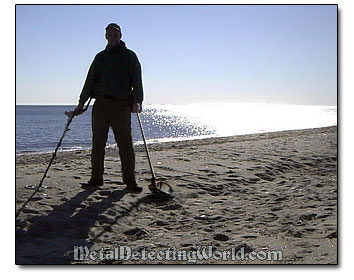Types of Metal Detecting Activities, page 13:
BEACH HUNTING, Beach Combing
General Information, Tips and Accessories and Metal Detectors Required

Beach Hunting or Beach Combing refers to metal detecting primarily the jewelry (rings, necklaces, chains, earrings, bracelets and anklets, religious medallions and crucifixes) and coins on any salt- or freshwater beach.
Other beach finds include watches, toys, knives, cigarette cases and lighters, sunglasses, keys, relics, cell phones, and other personal items.
Beach hunting is the most popular metal detecting activity and the only type of metal detecting that does not require any research since any beach that has been frequented by many people is a never-ending source of gold items and valuables.
Unlike coins, jewelry and relics that are hidden at the regular land sites and remain stationary in the ground until they are recovered with a metal detector, the beach valuables are constantly moved by natural forces.
Lost jewelry and coins are continuously repositioned by storms, gales and seasonal movements of sand (caused by high tides) which also replenish the beach with jewelry and coins that have been lost in water. This is why a beach hunter can keep coming back to the same beach and find valuables year after year.
Most of the coins and jewelry lost on the beach are dropped during the summer months of June through September. 90% of these items are lost on the dry beach sand. While a good portion of this load is found by the "summer beach hunters," a larger amount of jewelry and coins is either trodden deep into the sand or pulled into the water by powerful tides, and then collected in a zone that stretches between waterline and low tide mark.
For any beach hunter, gold finds are more desirable than silver ones not only because the price for gold is much higher than the price for silver, but also because the gold jewelry usually comes with more valuable gem stones and diamonds. One gold ring with diamonds can bring a small fortune! But finding the gold items is a challenge because the gold's low conductivity puts the gold jewelry into the conductivity range of pull-tabs and foil which are the most abundant junk items. If you discriminate them out, you will miss out on gold also.
LOCAL ORDINANCES ON BEACH HUNTING
Every beach is unique and has its own character and features, which depend on geographical specifics, climate zone, prevailing winds, amount of visitors and other factors. Also any beach may differ from other beaches by the local ordinances that either allow metal detecting or not. Always check with municipal regulations on beach hunting to make sure you are not violating them and to know specific times (if they are established) when you can search the beach.
Usually, a beach hunter is allowed to keep whatever he/she finds on the beach, unless it is a private beach, state or national park, or any historical site. In some states, dunes are off limits to beach hunters! To metal detect at a beach in a national park, a beach hunter is expected to get permission from the park authorities. One should make sure to have their permission in writing and keep it with oneself all the time while beach hunting.
To see what metal detectors for this metal detecting activity are available on the market today and read their reviews, you might want to visit my page on Metal Detectors for Beach/Surf/Underwater Treasure Hunting.